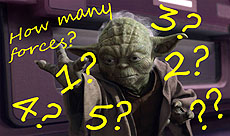How many forces?
 |
| Unlike in Star Wars, where there was but one force with a light and dark side, the number of fundamental forces is a much murkier question. |
If you've read many of my columns, you know quite a bit about the Standard Model. You know that there are quarks and leptons. You've heard about the gluon, the W and Z bosons, the photon and the graviton. And you know that this means that there are four fundamental forces: the strong and weak nuclear forces, electromagnetism, and gravity. Easy peasy.
However, the reality is actually a lot murkier: Not all forces are independent. For instance, back in the 1830s, scientists knew of two distinct forces: electricity and magnetism. But when Maxwell wrote down his equations for electric and magnetic forces in the 1860s, it became clear that the two were really one force, electromagnetism.
Similarly, in the late 1960s, physicists mathematically unified the electromagnetic and weak forces and showed that there was just one electroweak force. Under this reasoning, there are only three forces in nature: strong, electroweak and gravity.
But then the Higgs boson was discovered in 2012, indicating yet another force, specifically the Higgs force. So now we're back up to four. On the other hand, the Higgs mechanism is the phenomenon that makes the weak force and electromagnetism appear to be different. So maybe it's tied in with the electroweak force. That statement is as much speculation as theory, but it would bring the number of fundamental forces back down to three.
And then there is the hope of physicists to unify the electroweak force and the strong force into a single grand unified theory, or GUT. This would reduce the force count to two: the electroweak-strong-Higgs force and the gravitational force. We physicists are an ambitious lot, and we eventually hope to invent a theory of everything, or TOE, which would unify GUT and gravity. This would leave us with but a single force, and the apparent fundamental forces would just be different manifestations of the one primordial force.
So where does that leave us? Well, it's probably safe to talk of five fundamental forces (strong, weak, electromagnetism, gravity and Higgs) and probably more accurate to speak of four (strong, electroweak, gravity and Higgs). But physicists are constantly trying to figure out the fundamental rules of the universe, and perhaps we are just a clever thought or two away from reducing that count further.
The bottom line is that giving a number requires that you know what you are doing and what assumptions you are making. Physics, like all science, is a fluid endeavor and changes as our understanding improves. It's not the number that matters, but rather knowing what the number means. Unless we're talking lottery numbers. Then you better get it right.
—Don Lincoln
Want a phrase defined? Have a question? Email today@fnal.gov.
|